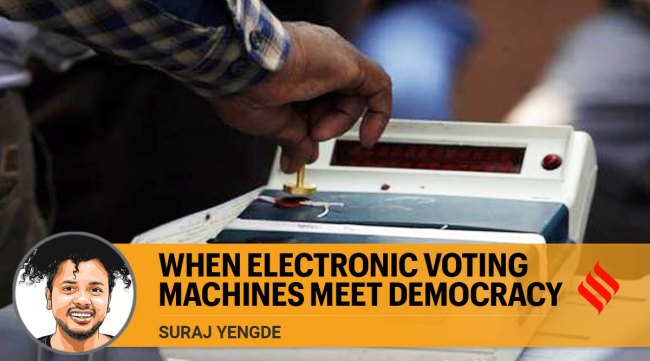Opinion When electronic voting machines meet democracy
The research community has demonstrated its defiance of EVMs. A 2010 study by Prasad, Halderman and Gonggrijp observed that EVMs are "vulnerable to serious attacks that can alter election results and violate the secrecy of the ballot".
 The role of any processual democracy is to ensure good functioning of the State and, in return, have a civilized society serving the needs of the citizens. (Express Photo)
The role of any processual democracy is to ensure good functioning of the State and, in return, have a civilized society serving the needs of the citizens. (Express Photo) The democratic process of any country demands transparency and decency. These two poles determine the electoral faith of citizens. But electoral democracy is just one part of democracy. It ensures that demos or the people of the nation have representation in structuring and functioning of the State. By having an election, their say in making laws is ensured. And the law determines the State.
However, do elections ensure democracy or is it the majority? Aristotle says the will of the majority is a bad idea because it can undermine the State. Democracy, in its pristine form, concedes to the will, wherein various factors decide the majority. In the Indian context, Dr B R Ambedkar argued that Indian metrics of power are decided with the majority and the minority, wherein the majority is both a number and a cultural majority. This takes the shape of communal majoritarianism, which acts as a self-contained group that is unable to think of the rest of society. Thus there have to be special constitutional provisions to advance the interests of the minorities and protect them from the atrocities of the communal majorities. That is how polity is separate from democracy, since the latter, by nature, demands revolution.
At the other end of democracy is autocracy which, if married with the principle of democracy, has the ability to produce demagoguery. The role of any processual democracy is to ensure good functioning of the State and, in return, have a civilized society serving the needs of the citizens.
Citizens having rights and duties prescribed by the Constitution ensure their participation in the engine of the State. Thus, the philosophy of liberalism is often conflated with that of democracy.
In a coherent form of democratic governance, absolutism and fear of autocratic tyranny are balanced by an engaged Opposition. An enigmatic process in a democratic society, the Opposition, like the government, is also voted by the people. Therefore, it is the voice of the public that is unrepresented in decision-making. The moral cause of the Opposition is to arouse a sense of liberty and patriotism through difficult nationalism. In his RPI manifesto, Dr Ambedkar had envisaged the work of the Opposition to be vigilant, exceeding the once-in-five years elections that do not guarantee “real democracy”.
Recently, Opposition parties such as the Congress, CPI, CPI(M), AAP, JD(U), Shiv Sena and NCP held a meeting in New Delhi to discuss the authenticity of processual democracy. Their suspicion was directed towards the efficacy of electronic voting machines (EVMs) handling the world’s largest elections. The Opposition often talks of technological interference via the Internet and programming of the machine as a tool for manipulation. But it must be noted that the parties present at the meeting have ruled or are currently in power in states.
Doubts over EVMs were also raised by the BAMCEF (Backward and Minority Community Employees’ Federation). They even launched a nationwide agitation on the issue.
The research community has demonstrated its defiance of EVMs. A 2010 study by Prasad, Halderman and Gonggrijp observed that EVMs are “vulnerable to serious attacks that can alter election results and violate the secrecy of the ballot”. Computer scientists from Italy and the US found that the system was open to “compromise”. Though one must take into account the efficiency of conducting elections via EVMs, the possibility of corrupting a gadget is easily possible.
The Government of India has been accused of deploying Pegasus software to spy on its citizens. Systems run by the Internet are prone to cyberattacks, as was proved in the case of Iran’s nuclear facility at Natanz. Cyberattacks involve theft of confidential data to manipulate programmes. With the public still ignorant of technological advances, the existence of esoteric knowledge on software manipulation makes EVMs an unfavourable option for many.
So how does one theorize the modern world in the womb of technology that is giving birth to new democracy? The Opposition should start by demonstrating its seriousness over EVMs and not simply bemoan every election. The complaint should be directed against the Election Commission, and not towards a government or a party that is bound to change.
Suraj Yengde, author of Caste Matters, curates Dalitality and is currently at Oxford University





